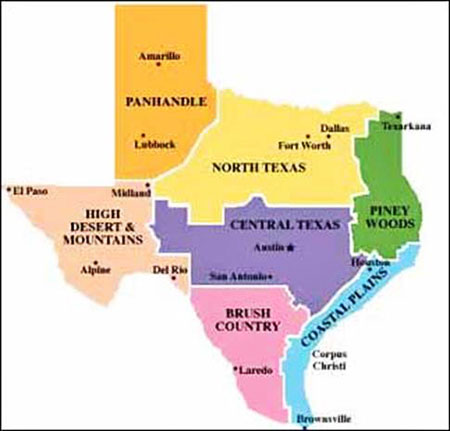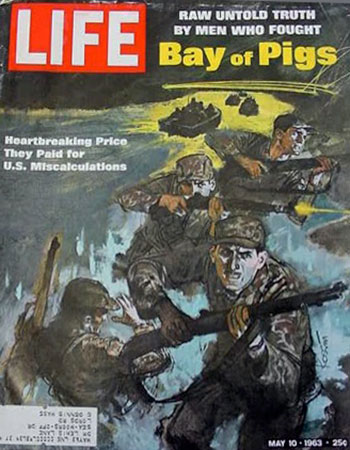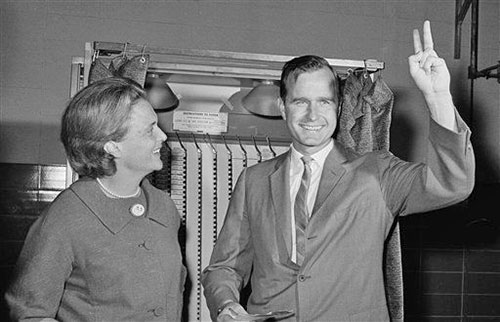|
Where was Poppy on November 22, 1963? October 02, 2013
"Somewhere in Texas"
Bush was indeed "somewhere" in Texas. And he had every reason to remember. At the time Bush was the thirty-nine-year-old chairman of the Harris County (Houston) Republican Party and an outspoken critic of the president.
He was also actively campaigning for a seat in the U.S. Senate at exactly the time Kennedy was assassinated right in Bush’s own state. The story behind Bush’s apparent evasiveness is complicated.
Yet it is crucial to an understanding not just
of the Bush family, but also of a tragic chapter in the nation’s history.
The Bay of Pigs invasion of 1961, designed to dislodge Fidel Castro and his Cuban revolution from its headquarters ninety miles off the Florida Keys, was an embarrassing foreign policy failure. Certainly in terms of lives lost and men captured, it was also a human disaster. But within the ruling American elite it was seen primarily as a jolt to the old boys’ network - a humiliating debacle, and a rebuke of the supposedly infallible CIA.
For John Kennedy it also presented an opportunity. He had been impressed with the CIA at first, and depended on its counterinsurgency against Communists and nationalists in the third world.
But the Bay of Pigs disaster gave him pause.
Whatever Kennedy’s own role in the invasion fiasco, it had been planned on
Dwight Eisenhower’s watch. Kennedy had been asked to green-light it
shortly after taking office, and in retrospect he felt the agency had
deceived him in several key respects.
The CIA had predicted that the island population would rise up to support the invaders. When this did not happen, the agency, Air Force, Army, and Navy all put pressure on the young president to authorize the open use of U.S. armed forces. In effect they wanted to turn a supposed effort of armed Cuban "exiles" to reclaim their homeland into a full-fledged U.S. invasion.
But Kennedy would not go along. The success of
the operation had been predicated on something - a popular uprising - that
hadn’t happened, and Kennedy concluded it would be foolish to get in deeper.
Just weeks after the calamity, he offered this account on Meet the Press:
For his part Kennedy was furious at Dulles for this self-serving explanation.
He also was deeply frustrated about the CIA’s
poor intelligence and suspected that the CIA had sought to force him into an
invasion from the very beginning.
The president told his advisers he wanted,
Within weeks of the invasion disaster, Washington was speculating on Dulles’s departure.
By autumn, he was gone, along with his
lieutenants Charles Cabell and Richard Bissell. But in the
end, it was not the CIA but rather John F. Kennedy who was destroyed.
Most "respectable" academics, journalists, and news organizations don’t want to get near the matter, lest they be labeled conspiracy nuts. Most Americans harbor an overwhelming psychic resistance to what retired UC Berkeley professor and author Peter Dale Scott has called the "deep politics" surrounding the assassination.
Few of us care to contemplate the awful prospect
that the forces we depend upon for security and order could themselves be
subverted.
This obsession with the gun or guns bypasses the more basic - and therefore more dangerous questions:
Subsequent inquiries have found the commission’s process, and the resulting report, horrendously flawed. And there are lingering questions about the very origins of the commission.
First, all the members were appointed by
Kennedy’s successor, Lyndon B. Johnson, who was - stark as this may
sound - a chief beneficiary of the assassination, having immediately
replaced the dead president to become the thirty-sixth president of the
United States.
To get Warren to say yes, Johnson had warned the
justice that Oswald might be tied, through an alleged Mexico City visit, to
the Soviets and Cubans. He implied that this could lead to nuclear war if
level heads did not prevail.
And that got Warren - and the public trust he
brought - on board.
In ousting him, Kennedy was showing the door to a man who had spent his entire adult life in spy work. Behind the pipe-smoking, professorial mien, Allen Dulles was a ruthless, calculating man with blood on his hands.
Certainly, the veteran master spy, director since 1953, could not have expected to stay on under Kennedy indefinitely. But to be forced out after what seemed to him a glorious decade of covert operations (including successful coups in Guatemala and Iran) - and on account of what he considered Kennedy’s failure of nerve regarding the Bay of Pigs invasion - must have been galling.
Dulles was, according to his subordinate E. Howard Hunt, a,
In 1961, when Dulles brought his successor, John McCone, to a dinner at Prescott’s home, the senator recalled that he,
He expressed this anger in a condolence letter to Allen Dulles’s widow in 1969, discovered among Dulles’s papers at Princeton University.
Prescott’s next line is particularly memorable:
The expression of such lingering resentment, six
years after JFK’s death, was doubly chilling because it came just months
after a second Kennedy, Robert, had been gunned down under mysterious
circumstances, once again by a seemingly unstable lone gunman.
Prescott Bush, having already begun his reelection campaign and opened his headquarters, surprised virtually everyone by reversing himself and announcing that he would not seek a new term after all. The reason he gave was that he was tired and physically not well enough to endure another six years.
This decision struck people as curious, in part because Prescott so dearly loved his life in Washington, and in part because he would turn out to be physically robust for a number of years afterward, and would even express his deep regret at having chosen to leave the Senate.
Whatever took him away from Washington seems to
have been pressing.
At a Washington political gathering, Prescott pulled aside the Harris County (Houston) GOP chairman, James Bertron, and demanded that Bertron find a place in his organization for Poppy.
This pressure quickly paid off.
In the fall of 1962, Poppy was named finance co-chair of the Harris County Republican Party, a position which likely entailed visiting wealthy oilmen and asking them for money.
Just a few months later, in early 1963, James Bertron abruptly announced his intention to retire and move to Florida, and Poppy announced his intention to succeed him. A party activist who had expressed his desire for the position suddenly abandoned his candidacy, and Bush won the position by acclamation.
Now he had a plausible reason not only to be
visiting with wealthy oilmen, but also to be building an operational team,
ostensibly for political purposes.
The trip seemed ambitious, especially when one
considers the realistic opportunities for a firm with just a few rigs.
As Harris County chairman, Poppy had Houston as
his bailiwick. But as a Senate candidate, he had every reason to be seen all
over the Lone Star State.
Jack and Bobby Kennedy, meanwhile were busy strategizing exactly how to prevent that - and this was going to be a crucial battle, given JFK’s wafer-thin victory in the previous election.
Two states in particular would be battlegrounds: Florida and Texas. In theory, a candidate like Poppy Bush, with his family connections to Wall Street, could be a strong fund-raiser and perhaps contribute to a substantially increased Republican turnout in 1964, even if Bush himself was not elected.
To head off this larger threat, it was clear to
Kennedy’s political advisers that Jack would have to campaign in Texas,
along with Florida. Kennedy was interested in revoking the oil depletion
allowance, a decision that would have meant steep losses for Texas oilmen,
and he continued voicing his support for civil rights, always a contentious
issue in the South.
Poppy and Barbara
November 3, 1964
So Poppy Bush’s inability or unwillingness to say where he was on that day is extremely odd, to say the least.
The FBI, the article goes on to say, promptly followed up on Bush’s tip and interviewed the Young Republican, a man by the name of James Milton Parrott.
Parrott claimed he had never threatened Kennedy,
and his mother declared that he had been at home with her in Houston all
day.
His call brought a familiar response:
Acoca’s story about Bush didn’t get much attention, running on page A-II of the Examiner.
The media reaction was similar to that which
greeted journalist Joseph McBride’s earlier revelations: next to nothing. A
few newspapers picked up the Examiner piece off the Hearst wire, but not a
single paper bothered to assign reporters to follow up.
Oliver Stone’s JFK, released in December
1991, had aroused public interest and helped prod Congress to unanimously
pass the President John F. Kennedy’s Assassination Records Collection Act of
1992. It required each federal agency to collect and forward all records
about the JFK assassination to the National Archives, which would then make
them available to the American people.
Bush, with little enthusiasm, signed the bill - though, in a move that his son George W. Bush would use without restraint, Poppy issued a "signing statement" that essentially attached conditions, asserting unilateral executive authority to withhold records on the basis of several concerns, including national security.
Still, Poppy couldn’t claim national security
about everything, certainly not about documents that some already knew to
exist, especially documents that had his own name on them.
In fact, government records show that the
complete FBI memo from December 22, 1963, laying out the particulars of
Bush’s call to the agency was finally declassified in 1993, along with
thousands of other papers - by the Clinton administration.
The memo contained several intriguing details, but no news organization picked up on them. Indeed, no one paid any heed to the whereabouts of Poppy Bush at the time of the JFK assassination - except Barbara Bush.
In 1994, three decades after Poppy began not
remembering where he was on November 22, 1963, it was suddenly Barbara who
remembered.
|



